
Parenting is a journey filled with joys, surprises, and yes, challenges. Influencer and mother Molly-Mae Hague, known for her open and honest approach to parenting, recently shared her experience with a particularly difficult issue: her two-year-old daughter, Bambi, biting other children at nursery. In her latest YouTube video, Molly-Mae dives deep into the complexities of toddler behavior and questions whether certain parenting approaches, such as ‘gentle parenting,’ truly work.
Understanding the ‘Biting Phase’
Toddlers biting other children is not uncommon. As Molly-Mae explained, the nursery where Bambi attends is currently experiencing what she called a ‘biting pandemic,’ where children appear to be copying one another’s behaviors. This behavior, while troublesome, is often a form of testing boundaries at such an early developmental stage.
Molly-Mae shared, “I got a call today from the nursery to tell me she’s bitten another child. This isn’t the first time, and I wasn’t surprised given that she came home recently with a bite mark herself.” As a parent, balancing the urge to discipline while fostering empathy and understanding can be incredibly complicated.
Gentle Parenting: Is It the Right Approach?
Gentle parenting emphasizes positive reinforcement, communication, and empathy over traditional forms of discipline like reprimanding or punishment. Molly-Mae expressed her uncertainty about whether this method is addressing the issue effectively. She noted, “At nursery, they tell her things like, ‘Your mouth is for chewing food, not biting.’ But with no firm consequences, I wonder if she understands the gravity of her actions.”
The debate over gentle parenting is a hot topic among modern parents. It’s praised for fostering emotional intelligence and a nurturing environment but critiqued for potentially allowing children to push limits without clear boundaries.
Seeking Solutions: Molly-Mae’s Reflection
After consulting family members, Molly-Mae admitted feeling conflicted about rewarding her daughter with an ice cream outing after a biting incident. She explained, “I don’t want her to think she’s being rewarded for bad behavior, but at the same time, I’m not sure if bringing more attention to it helps either.”
Interestingly, Molly-Mae even turned to the AI assistant ChatGPT for advice on the matter. The recommendation? Avoid ‘punishing’ the child twice by raising the issue long after it’s happened, as toddlers may struggle to connect the reprimand to their earlier actions.
Real Recommendations for Parents
Parenting experts and seasoned guardians alike chimed in with supportive advice, including practical strategies that others can implement:
- Read age-appropriate stories about kindness and being gentle to promote positive behaviors.
- Use simple, clear language: “Teeth are for biting food, not friends.” Repetition helps reinforce this message.
- Demonstrate frustration alternatives: Teach children to express anger or discomfort without biting, such as taking deep breaths or using words.
Explore Tools to Ease Parenting Challenges
If you’re finding yourself in similar situations as Molly-Mae, consider utilizing parenting aids like “No Biting!” by Leslie Patricelli, a playful and effective children’s book designed to teach toddlers about acceptable behaviors. Pair this resource with consistent, patient communication to build healthy habits in young minds.
A Message of Hope
Molly-Mae’s candidness reminded parents around the world that they’re not alone in their struggles. “It’s so embarrassing for me because it’s the complete opposite of what I want my child to be. But she’s two and a half – testing boundaries is part of the process,” she noted.
Many viewers commended her honesty in the video, appreciating her vulnerability and relatability during what can be a very challenging season of parenthood. As one comment put it, “Don’t worry—it’s just a phase. What matters most is staying consistent in your love and guidance.”
Parenting will always come with unexpected hurdles, but sharing experiences like Molly-Mae’s helps create a supportive community where parents can learn, adapt, and grow together.





